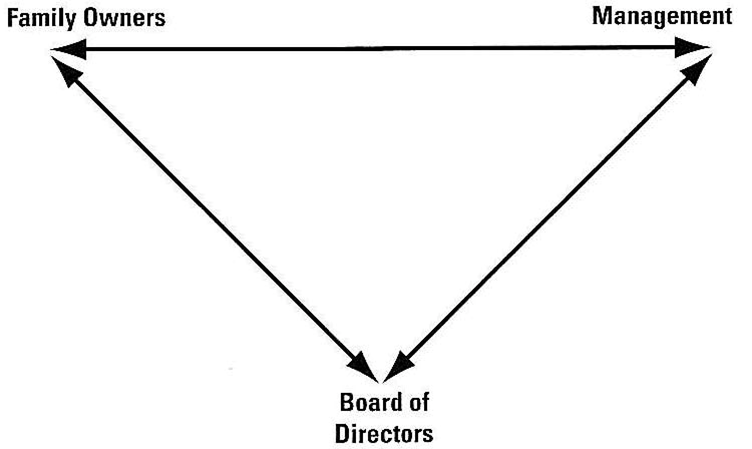There has been a broad discussion around the roles and responsibilities of boards in family enterprises. However, for boards to serve well, they must also have an understanding of the proper roles and responsibilities of the family ownership group. Then they can counsel the owners to fulfill their contribution and understand the interactions between ownership and management. In a family business where the owners also share the values and emotions of an intimate history, governance might best be seen as a set of relationships among management, owners, and the board of directors. Each group has distinct roles and responsibilities. The following is a framework that outlines the roles and responsibilities of family ownership.

Ownership’s Contribution
Owners can provide substantial value to the performance and continuity of an enterprise if it is united, committed and responsible. An ownership group that speaks with one voice liberates management to focus on the business instead of fearing shareholder disputes. Sharing a long-term view provides strategic stability and enhances risk-taking. Responsible ownership reassures the board, the management and other shareholders. Responsibility includes respecting the limits of ownership’s roles, understanding the business and providing leadership for the governance process.
Providing this unity, commitment and responsibility suggests that owners have consensus on the purpose of their ownership, on the policies affecting ownership, and on the processes needed to strengthen their resolve.
Purpose Of Ownership
It’s the role and opportunity of owners to promote their collective values, their vision for the enterprise and their goals as owners.
Values
Governance is effective if both family ownership and the board share a consensus on values, vision and goals. Owners’ values, such as stewardship, transparency, paternalism, innovation, trust and democracy, shape the culture of the business. If the owning family isn’t clear about its values, the business culture will be shallow and the family’s commitment to ownership weakened. Pride of ownership is largely a function of a distinct and powerful business culture that reflects values that are important to the owners.
Vision
The owners’ values shape the vision they have for the business. There are two dimensions to the owners’ vision: their vision for the nature of the business and their vision for the structure of their ownership. Do the owners want a diversified, multi-business company or do they want to be concentrated in one industry? Do they want a business focused on the needs of the local community or a global company that expands the horizons of family members? Do they want a business that welcomes family employment or depends on non-family management?
Regarding the structure of ownership, the owning family needs to provide clarity on who can own shares and who can vote the shares. Some families want public ownership, others private partners, others neither. Some families concentrate voting rights in trusts or general partners. Others are eager to distribute the shares quickly throughout the family and democratize voting privileges.
For example, ownership must clarify whether spouses that join the family may hold shares in the business, and to whom shareholders may sell if they no longer want to participate as owners. Among larger family companies, the family may need to determine if it wants the business to be a publicly traded, multi-business holding company that grows from joint ventures with global partners under the majority control of a family voting trust to assure family leadership for generations to come. Small business or large, the board needs to exhort and advise the family to clarify its vision for ownership.
Goals
Owners also must attempt to present a set of goals for the business that satisfies their interests and secures their commitment, yet are reasonable for management to meet. The four goal areas that seem to be within the province of ownership are:
Growth Risk Profitability Liquidity
These four goals are, of course, interdependent. More of one means less of the others. The fundamental trade-offs that are made among these goals reflect the owning family’s values and vision for the business. One family may believe that the best way to assure ownership’s long-term commitment is through generous dividends and redemption opportunities. Another family may feel that reinvesting in an increasingly diversified portfolio of businesses that provides exciting career paths for family members is a better idea. The board can help educate the family on the inherent goal trade-offs of ownership. The board also must provide candid feedback on whether the family’s goals are feasible or appropriate for the business and its future.
Policies
In addition to values, vision and goals, the owning family needs to address the issues that define its relationship with the business. Following is a list of policy areas that ownership is responsible for determining:
- Interactions with management and directors
- Information
- Confidentiality
- Conflicts of interest (suppliers, customers, investments, new ventures, competition)
- Shareholder relations expenses
- Estate planning
- Redemptions
- Dividends
- Charitable giving amounts and focus
- Succession to governance roles (trustees, general partners, directors, chairs, CEO)
Board effectiveness
The board can play several valuable roles as the family develops these policies. The board can offer objective feedback on whether the policies being forged are consistent with the family’s stated values, vision and goals. The board also can aid the family as it works to define processes for decision making.
Processes
Developing family consensus on the purposes and policies of ownership is not a simple effort, nor is it done once and for all time. Therefore, at the heart of providing a united, committed and responsible ownership group are processes to learn and processes for making decisions.
The owners need to have informed and knowledgeable next-generation owners, otherwise commitment and unity are frail. So, providing education for current and future owners is part of ownership’s role.
Certainly, management and the board can and should help a lot, but it’s the owners themselves who are ultimately responsible for what they know and how hard they are willing to work at it.
Three subject areas are fundamental to the owners’ education: understanding the culture of the business and how they can contribute to it; understanding the business strategy and how to track it; and understanding governance. For example, the owners must take intellectual leadership for the effectiveness of the board, as they have the ultimate authority over it. Good boards depend on knowledgeable owners.
Owners also need a good decision-making process. If the process is seen as just or fair, then differences of positions can be accepted. If the process is corrupted by a lack of information, knowledge or involvement, then unity and commitment are very much at risk.
Finally, the decision-making process needs to evolve over time as the next generation of family owners grows in age and conviction. If succession processes and expectations for authority and control aren’t clear or satisfactory, ownership disputes or dissatisfactions are inevitable. Succession needs to be addressed for ownership, for voting rights, for directorship and for leadership.
While this article is aimed at clarifying the roles and responsibilities of a family ownership group, it also is aimed at directors who need to understand the owners’ rights and requirements so they can both encourage and support the owners’ efforts, and so they can clarify the board’s and management’s roles in governance. Each group—the board, the owners and management—plays an essential and interdependent part in an effective governance system. Because the concept of ownership is, perhaps, less well-developed or understood than the concepts of boards and management, directors can provide invaluable guidance to owning families as they work to understand their role.
